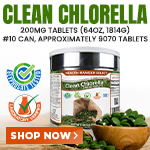
Beat digestive problems with the FODMAP plan
Tuesday, February 04, 2014 by: Dr. David Jockers
Tags: intestinal health, FODMAP diet, bower disorders
- Fauci is back in the limelight, and he’s busy promoting a future COVID or FLU pandemic
- Tulsi Gabbard leads charge against the Biden regime’s global censorship of the 'Disinformation Dozen'
- Aerosolized bioweapons? Strange “diploid biomasses” falling out of the sky in Florida captured under the microscope
- How Israeli military-connected corporations are secretly controlling your online privacy
- DEADLY FLU JAB WARNING: New flu vaccines make recipients 27 PERCENT MORE LIKELY to catch the flu
- New study links mRNA vaccines to GENETIC CHANGES - and not the good kind
- Idaho Gov. Brad Little signs Medical Freedom Act banning vaccine mandates
- Kiss Your Genetic Privacy Good-Bye! 23andMe Gets Green Light to Sell Your Intimate Genetic Details to Anyone They Want
- Analysis: The coming economic collapse, a mass uprising and Trump's three secret weapons to halt the growing revolt
- U.S. lawmakers investigate Meta over alleged China collaboration
- Tulsi Gabbard takes aim at censorship: Justice for the ‘Disinformation Dozen’
- Widespread social and economic unrest: Steve Quayle issues urgent financial warning of imminent asset collapse in new interview with Mike Adams
- DEATH BY DOCTOR: Why and how doctors are now PAID TO KILL their patients
- Curcumin’s ancient healing power supercharges muscle recovery, and its effects are compounded with anti-inflammatory foods and supplements
- Mike Adams releases country western hit single: Goin’ Back in Time is Comin’ Home
- Trump’s EPA reviews fluoride safety amid growing concerns over risks to children’s health
- A comprehensive guide to DANDELIONS, an ancient herbal medicine and superfood
- China’s counter-tariff strategies: A new chapter in the U.S.-China trade war
- Aerosolized bioweapons? Strange “diploid biomasses” falling out of the sky in Florida captured under the microscope
- Analysis: The coming economic collapse, a mass uprising and Trump's three secret weapons to halt the growing revolt
- Kiss Your Genetic Privacy Good-Bye! 23andMe Gets Green Light to Sell Your Intimate Genetic Details to Anyone They Want
- Widespread social and economic unrest: Steve Quayle issues urgent financial warning of imminent asset collapse in new interview with Mike Adams
- Defunding DEADLY mRNA jabs: Government funding for mRNA technology being scrutinized and sidelined until proven "safe and effective" for real
- CLOT SHOT PLANDEMIC UNFOLDING: Fibrous, rubbery clots caused by covid injections have prion-like seeding activity
- European Court of Justice: Healthcare professionals who promoted or administered COVID-19 vaccines are CRIMINALLY LIABLE for any harm caused
- Mike Adams releases country western hit single: Goin’ Back in Time is Comin’ Home
- DEATH by VACCINE or face PRISON time: Canadian Freedom Convoy leaders CONVICTED for protesting forced vaccination during the Covid Plandemic
- Newly released JFK files reveal Pentagon's role in creating Lyme disease and covid in the same lab
- “Project Aldrin”: Senate probes Meta's alleged censorship dealings with China
- How Israeli military-connected corporations are secretly controlling your online privacy
- The hidden war above: Chemtrails, HAARP and the battle for planetary control
- Federal employees whine over DOGE's new directive requiring them to do a 5-point summary of weekly accomplishments
- FBI imposed gag order on agents to silence Hunter Biden laptop truth before 2020 election, new chat logs reveal
- Tulsi Gabbard leads charge against the Biden regime’s global censorship of the 'Disinformation Dozen'
- U.S. approves new Russian ambassador as diplomatic thaw continues
- I Want My Bailout Money – new song released by Mike Adams
- Newly released JFK files reveal Pentagon's role in creating Lyme disease and covid in the same lab
- Mike Adams releases country western hit single: Goin’ Back in Time is Comin’ Home
- Dr. Mike Yeadon releases 15-minute testimony - WATCH - about genocidal intent of COVID “vaccines”
- The Health Ranger releases “Vaccine Zombie” song and music video, using AI-animated zombies for the music video
- California's social media censorship law struck down: A victory for free speech or a threat to online safety?
- EPA advisor admits the agency is funneling billions to climate groups ahead of Trump’s return to White House
- Rep. Nancy Mace introduces bill to ban biological males from female facilities on federal property
- OpenAI whistleblower who dissented against how the company trained ChatGPT found dead
- Survival 101: Effective EMF blocking techniques
- Analysis: The coming economic collapse, a mass uprising and Trump's three secret weapons to halt the growing revolt
- MEDICAL BOMBSHELL: FDA admits Covid mRNA 'Vaccines' CAUSE CANCER
- CONSERVATIVES SOUND THE ALARM: Big Pharma and the Left trying to force $32 billion money grab from America’s seniors into year-end spending deal
- Florida takes a stand: DeSantis proposes permanent ban on mRNA vaccine mandates
- Sugarcane extract superior to cholesterol-lowering drugs?
- Pilots report mysterious lights 'moving at extreme speeds' across Oregon skies
- Trump reverses course on Gaza plan, says “nobody is expelling Palestinians”
- 5 Simple steps to boost your brainpower: How to strengthen executive function in a distracted world
- Trump Administration cuts 2,000 USAID jobs, places most employees on leave in sweeping reform effort
- Red Cross issues warning to stop blood plasma donations from vaccinated people
- Scientists confirm: GENIUS brain function can be spontaneously unleashed in humans without any apparent cause
- EPA advisor admits the agency is funneling billions to climate groups ahead of Trump’s return to White House
- HYSSOP: What research reveals about the health benefits of this ancient holy herb
- Two containers with completed ballots fall out of truck in Florida
- Fully vaccinated about to see “tsunami” of illness and death, warns virologist
- Global leaders unite to clamp down on “misinformation” with UN-backed Cascais Declaration
- Newly released JFK files reveal Pentagon's role in creating Lyme disease and covid in the same lab
- BREAKING: 2025 NDAA authorizes mandatory military draft of WOMEN across America… as Pentagon pursues global NUCLEAR war with both Russia and China at the same time
- Michael Yon warns of a ZIONIST TAKEOVER in Trump’s second administration
- Ozempic and Wegovy weight loss drugs are injectable LIZARD VENOM PEPTIDES that may unleash a devastating wave of organ failure… side effects align with symptoms of SNAKE BITES
- The Health Ranger releases “Vaccine Zombie” song and music video, using AI-animated zombies for the music video
- BOMBSHELL: DNA testing kits are a SCAM to develop ethnic-specific bioweapons
- Israeli soldiers accused of even more torture and abuse in the West Bank
- These 13 countries just signed an agreement to engineer a global FAMINE by destroying food supply
- NASA admits that climate change occurs because of changes in Earth’s solar orbit, and NOT because of SUVs and fossil fuels
- RFK Jr. clears key hurdle: Sen. Susan Collins backs controversial HHS nominee, signaling a new era for health policy
- Sermon 30: How Jesus reveals Caesar’s FAKE CURRENCY and FALSE AUTHORITY
FODMAP is an acronym for Fermentable Oligo, Di- and Monosaccharides and Polyols. These are all types of sugar-based carbohydrates that are found in certain foods and are challenging on the bowel. These sugars include glucose, fructose, galactans, polyols and lactose among others.
The symptoms the FODMAP plan helps with
Individuals who struggle to digest these carbohydrates typically experience symptoms that include abdominal discomfort, bloating, cramping, nausea and/or pain after eating foods with these FODMAPS. These sugars are osmotic and pull water into the intestinal tract which accounts for the diarrhea. Most symptoms appear within 30 minutes to two hours after eating.These individuals have a condition called small intestinal bacterial overgrowth (SIBO) in which their digestive system is loaded with pathogenic microbes. The FODMAP's are a fuel source for these microbes who release toxic byproducts as they metabolize the sugars. The toxicity that the microbes release causes the digestive discomfort and overtime leads to many different health challenges.
The FODMAP diet restrictions
The typical restrictions on a FODMAP diet include generally inflammatory foods such as gluten, unfermented soy, peanuts and often nightshade vegetables. The diet also removes foods high in fructose such as lots of fruit (often lemon/lime and small amounts of berries are tolerated), honey and agave nectar.These individuals can only consume fermented dairy in the form of hard cheeses like cheddar, Swiss, blue cheese and feta. They do not do well with yogurts, kefir or amasai. They can very well tolerate pasture-fed butter and ghee. All the dairy should all be from grass-fed cows or goats.
Fructans are also known by the prebiotic inulin. This is a non-digestible fiber that is healthy for those with normal bowel flora. Fructans are found in wheat, onions, garlic, artichokes, asparagus, sugar snap peas, cabbage, shallot, leeks, cauliflower, mushrooms, pumpkin & green peppers are often not tolerated well.
Galactans are the primary carbohydrate found in beans, lentils and legumes. These are not tolerated well by individuals with digestive problems. Polyols include sugar alcohols such as sorbitol, mannitol, xylitol, maltitol and erythritol. Other foods that have polyols include pitted fruits like avocado, apricots, cherries, nectarines, peaches and plums.
The typical FODMAP nutrition plan
The typical nutrition plan for someone struggling with digesting FODMAPs is somewhat restricted but not hard to figure out. Breakfast can include a protein shake with coconut milk and a non-denatured, grass-fed whey protein or vegan protein such as hemp. One could also do pastured eggs cooked in coconut oil with green veggies, herbs, fresh squeezed lemon and herbs.For lunch these individuals could do a big salad with olive oil and grass-fed cheddar cheese or pastured chicken. For dinner they could do steamed broccoli, a small salad and grass-fed beef or wild-Alaskan salmon or another quality animal protein with olive oil, fresh lemon and herbs.
More digestive health strategies
It is always a good idea for individuals with digestive issues to use organic bone broth and make soups and stews. The bone broth provides raw materials that help to repair the intestinal lining and does not contain any of the FODMAP sugars. Organ meats are also highly advisable because of their rich nutrient content.Many individuals with digestive disorders find great success using intermittent fasting strategies such as eating one or two meals per day and doing lots of hydration during the non-eating periods. They also remark about the great relief they get from the nagging symptoms when they follow these nutrition principles.
Sources for this article include:
http://www.health.arizona.edu
http://stanfordhospital.org
http://www.quickanddirtytips.com
About the author:
Dr David Jockers is a Maximized Living doctor and owns and operates Exodus Health Center in Kennesaw, Georgia where he specializes in functional nutrition, functional medicine and corrective chiropractic care to get to the underlying cause of major health problems.
His website features great articles on natural health and incredible recipes. He is the author of the best-selling book SuperCharge Your Brain - the complete guide to radically improve your mood, memory and mindset. He has over 50,000 active followers on his social media and email newsletter and is a big influencer in the Primal Health movement.
Dr. Jockers is also available for long distance consultations and health coaching to help you beat disease and reach your health goals. For more information got to www.drjockers.com
Intestinal health at FETCH.news
Get independent news alerts on natural cures, food lab tests, cannabis medicine, science, robotics, drones, privacy and more.
Take Action: Support Natural News by linking to this article from your website
Permalink to this article:
Embed article link: (copy HTML code below):
Reprinting this article:
Non-commercial use OK, cite NaturalNews.com with clickable link.
Follow Natural News on Facebook, Twitter, Google Plus, and Pinterest
Science News & Studies
Medicine News and Information
Food News & Studies
Health News & Studies
Herbs News & Information
Pollution News & Studies
Cancer News & Studies
Climate News & Studies
Survival News & Information
Gear News & Information
News covering technology, stocks, hackers, and more



"Big Tech and mainstream media are constantly trying to silence the independent voices that dare to bring you the truth about toxic food ingredients, dangerous medications and the failed, fraudulent science of the profit-driven medical establishment.
Email is one of the best ways to make sure you stay informed, without the censorship of the tech giants (Google, Apple, Facebook, Twitter, YouTube, etc.). Stay informed and you'll even likely learn information that may help save your own life."
–The Health Ranger, Mike Adams












































